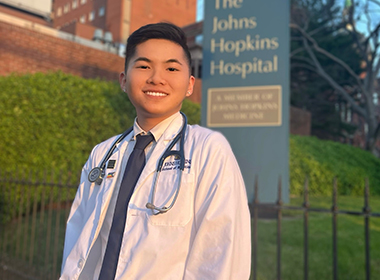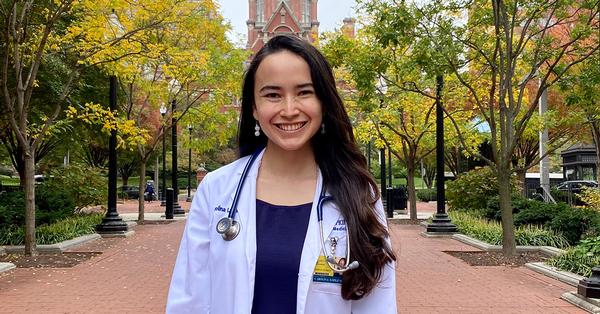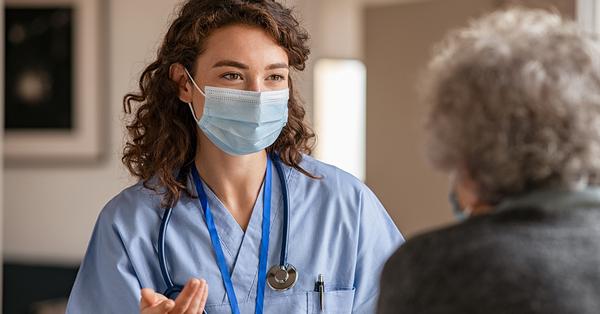HIV Testing Program Provides Valuable Support to Community Clinics
Program provides students with real-world experience, meaningful patient interactions

First-year medical school student Andrew Ly volunteers at the Johns Hopkins Harriet Lane Clinic.
An estimated one in eight people living with human immunodeficiency virus (HIV) in the United States do not know they have it, according to the Centers for Disease Control and Prevention. To remedy this, Johns Hopkins SOURCE, a community engagement and service-learning center, established an HIV Counseling and Testing Program in 2007. The program partners with community clinics and trains Johns Hopkins students to conduct testing and counseling.
“HIV testing and health education services are so important and should be available to everyone,” says volunteer Max White, a fourth-year Johns Hopkins University School of Medicine M.D., Ph.D. student. “HIV today is a condition that is very treatable but can also be very dangerous if you don’t know you have it. Knowing your status helps keep yourself and the people around you safe.”
HIV Counseling and Testing volunteers work at the Johns Hopkins Center for Adolescent/Young Adult Health located in the Harriet Lane Clinic, the Johns Hopkins Hospital Emergency Department and Baltimore Crisis Response, Inc. The volunteers come from the medical school, the Johns Hopkins University School of Nursing and the Johns Hopkins Bloomberg School of Public Health. Trained by the Maryland Department of Health, the volunteers learn about the science of HIV and acquired immunodeficiency syndrome (AIDS), risk reduction, counseling techniques and testing options.
“The program provides valuable infrastructure support to our community clinics,” says Mindi Levin, founder and director of SOURCE. “It also enables students interested in HIV and AIDS to practice their skills in clinical settings.”
For White, having an opportunity to interact with patients has been a rewarding part of the experience. At the Harriet Lane Clinic, the volunteers have the chance to counsel and test adolescents and young adults ages 13 to 24.
“Seeing patients is a meaningful part of medical school for me,” White says. “I love working in the Harriet Lane Clinic. It’s a wonderful primary care environment. You can feel how passionate the providers are and you’re working to help meet the needs of the Baltimore community.”
One question White always asks patients is if they know what “HIV positive” means. Many don’t, and a few say that “it means you will die young.” White does his best to educate patients that HIV, which reached pandemic level in the 1980s, is no longer a death sentence because of today’s effective treatments.
“Just having HIV doesn’t prevent a person from living a long and healthy life,” he says. “The misconceptions can be stigmatizing and I strive to help patients understand that.”
White says compassion and understanding are a big part of his counseling and testing role.
“Being able to meet people where they are at no matter what their behaviors are is essential,” White says. “You have to be a good listener and give them space to share. Education is also a huge part of this job. Volunteers have to be able to simplify medical concepts in a way that patients understand.”
First-year medical school student Andrew Ly also volunteers at the Johns Hopkins Harriet Lane Clinic. Ly, who identifies as queer, volunteered for the program because he wanted to provide support for people living with HIV, who are sometimes queer and vulnerable.
“It’s so important to be nonjudgmental in this role because someone could feel invalidated,” Ly says. “Striving to be nonjudgmental improves the care that you give. I try to approach it from a perspective of trauma-informed care. You never know when patients could be experiencing traumatic moments in their life. Compassion is key.”
Each shift, Ly introduces himself to the physicians. He lets them know he’s available to offer rapid HIV testing services and provide counseling. Ly goes in with or after the physician and talks to patients about factors that put them at risk for HIV. He also offers them resources for safe sexual encounters as well as community resources.
“It’s exciting that I’m able to touch the lives of so many different people,” he says. “I’m helping them through their journey whether they’re getting tested or living with HIV. It’s an immense privilege to be in the position. I would love to continue volunteering in the next academic year.”
With one patient, Ly had to deliver a preliminary positive diagnosis to a patient, meaning the rapid test is positive but a definitive diagnosis is not confirmed until a blood test is completed.
“It’s a challenging time,” Ly says. “In these moments, I’ve learned a lot about how the power of words can affect the way a patient interacts with the world.”
First-year school of medicine student Jack Loftus has been volunteering at the Johns Hopkins Hospital Emergency Department.
“The opportunity to be in the hospital is great,” says Loftus. “I get to be with patients and take blood samples and oral swabs. I’ve learned a lot about HIV in Baltimore and what services are available.”
Loftus says he was surprised about the extent to which he was brought into the workflow.
“I got to wear the scrubs and be there in the Emergency Department. I was given a level of independence that was exciting!” he says.
Loftus says it’s crucial for a program volunteer to be a self-starter.
“I always approach it with an eye to how I can support the work,” he adds. “This program is so important. Baltimore has a significant HIV epidemic. We’re helping prevent transmission and get people into care as soon as possible.”
Levin says students interested in volunteering must first consider their career goals.
“This is a year-long academic program,” she says. “We’re looking for individuals who see this program as something that will enhance their academic experience. This is a great opportunity to gain real world experience and work directly with patients.”


